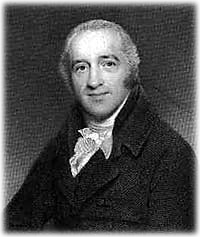Home
Authors
Titles
Keyword Search
Reference
|
Charles Simeon was born on September 24, 1759. He attended school at Eton and enrolled at King's College, Cambridge, in 1779. Although baptized as an infant, his family was not particularly religious and neither was Charles, until an experience during his first few months at university. All Cambridge students were required to receive communion at least three times each year during their time in university. After arriving at Cambridge, in January, and learning of this requirement, Simeon wrote in his diary: Although Simeon made his January Communion, he continued to feel he was unworthy. He reflected, concerning his former sins, that he was "so greatly oppressed with the weight of them, that I frequently looked upon the dogs with envy." He found he had so many sins, that he despaired of ever fully making restitution for them. During Holy Week, Simeon was reading "Bishop Wilson's" book, which was speaking of the Jewish sacrifices in the Old Testament, and of the sacrifice whereby the sins of the people were laid upon the head of the goat (scapegoat) that was brought as an offering. Simeon experienced a revelation: The 1770s were difficult time to be an evangelical Christian in a university. The Anglican Church was in the midst of dealing with the new Methodist movement. The universities were, simultaneously, bastions of the established Church of England and seedbeds of Enlightenment rationalism, neither of which made them sympathetic to religious fervor. A few years before Simeon's arrival at Cambridge, a group of students at Oxford had met on Sunday evenings for extemporaneous prayer and mutual encouragement. When a professor complained of "certain Enthusiasts in that Society, who talked of regeneration, inspiration, and drawing nigh unto God," the students were expelled. Simeon recalls in his memoirs that after his conversion, "for 3 years I knew not any religious person [at the university]." Despite the difficulty, Simeon believed he was called to ordained ministry, and he was ordained shortly after graduation by the Bishop of Petersborough. At this point something happened that would affect the remainder of Simeon's life: The vicar of Trinity Church, Cambridge, died in October, 1782, just as Charles Simeon, now a graduate, was preparing to leave Cambridge. Simeon had often walked by the church and said to himself, 'How should I rejoice if God were to give me that church, that I might preach the Gospel there and be a herald for Him in the University.' His dream came true when the Bishop appointed him 'curate-in-charge' (being only ordained a deacon at the time). He preached his first sermon there on 10th November 1782. The lonliness as a Christian that Simeon experienced as a college student was replaced by the active opposition of his new parisioners. The congregation did not care for Simeon's biblical preaching and would have preferred the assistant, Mr. Hammond, to become rector of the parish. They showed their displeasure toward Simeon by not attending and locking the small doors of their pews (which most churches had at the time). At times, they even locked the doors of the church to prevent Simeon from holding additional services. Simeon persevered, however, and remained rector of the parish for 54 years, gradually winning over his parishioners and making a great impact that reached well beyond Cambridge. In April, 1831, Charles Simeon was 71 years old. He had been the rector of Trinity Church, Cambridge, England, for 49 years. He was asked one afternoon by his friend, Joseph Gurney, how he had surmounted persecution and outlasted all the great prejudice against him in his 49-year ministry. He said to Gurney, "My dear brother, we must not mind a little suffering for Christ's sake. When I am getting through a hedge, if my head and shoulders are safely through, I can bear the pricking of my legs. Let us rejoice in the remembrance that our holy Head has surmounted all His suffering and triumphed over death. Let us follow Him patiently; we shall soon be partakers of His victory" (H.C.G. Moule, Charles Simeon, London: InterVarsity, 1948, 155f.). Author and pastor John Piper, relates the following incident from Simeon's life: Simeon's is best known as a great Bible expositor, and example revitalized preaching in the Church of England and set a standard for generations down to the present day. His magnum opus is his twenty-one volume Horae Homiletica— a collection of expanded, sermon outlines from all sixty-six books of the Bible. Among the many people influenced by Simeon was the Evangelical leader, Henry Martyn (1781-1812), who, inspired by Simeon, abandoned his intention of going into law and instead devoted his life and his considerable talents to preaching the Gospel as a missionary in India and Persia. The great British statesman William Wilberforce (1759 - 1833), also influenced by Simeon, became the most prominent figure in the abolition of slavery throughout the British Empire. Another part of Simeon's legacy is the founding of the Church Missionary Society in England, and the University and College Christian Fellowship, which, in turn, led to the founding of the Inter-Varsity Christian Fellowship in the United States and Canada, and the International Fellowship of Evangelical Students, with branches in many countries. Though he was a faithful pastor and preacher who spent his whole ministry in one parish in Cambridge, England, his influence extended throughout the Anglican and Evangelical Christian world. The Classical Library, This HTML edition copyright ©2006. |
Home
Authors
Titles
Keyword Search
Reference
 Charles Simeon (1759-1836)
Charles Simeon (1759-1836)